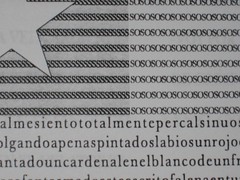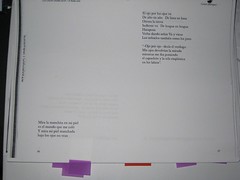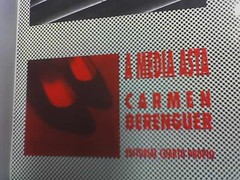Carmen Berenguer wins Ibero-American Pablo Neruda Poetry Prize
Happy Poetry Month! Congratulations to Carmen Berenguer who has won the 2008 Premio Iberoamericana de Poesía Pablo Neruda.
I am very happy for her!
And for everyone who will now read her marvelous poems!
It makes me extremely happy that work so radical, experimental, feminist, and wild, has been recognized and honored.
“Es una sorpresa por la poesía que yo hago, que de pronto puede ponerle trabas al entendimiento y al sentimiento. Mi poesía es sonora, interna, musical, digo cosas increíbles”, comenta. “Soy una mujer combativa, vengo de los conventillos, de la pensión y esos argumentos hicieron que me fijara en las injusticias”, agrega.
*
It’s a surprise because of the poetry I write, that can suddenly put up blocks to understanding and feeling. My poetry is echoing, internal, musical, I say unbelievable things. I’m a fighting woman, I come from the projects, from poor neighborhoods, and that background fixed my thoughts on injustice.
Berenguer often breaks words and form, with poem titles at the bottom of pages or strangely broken across two pages, like this:
and she ranges into concrete poems in her early work such as Bobby Sand desfallece en el muro as well as in later work such as the poem typeset to look like the Chilean flag. You can see a glimpse of that poem above.
I have translated some of her work over the last few years.
So far, I have spent the most time reading A media asta and La gran hablada. While I love her short poems, I am most fond of her longer work which sprawls and rants and sobs and screams across the page, long poems that build me up to a peak of understanding. It is not “leaping poetry” in the way that Bly meant, with graceful elisions. It is broken, unclear, obstructive, difficult, obstreporous. And, that is suitable, that is what is right, when you write about political violence, about gendered violence, about bodies, oppression, about Chile under Pinochet, as Berenguer does.
That is what I love best in poetry. I love when it has physicality, when it fights with sense, when it has elbows that stick out, when it feels like wading through mud or struggling to make my own broken body act and endure. It is poetry that rewards effort just as bodies do. Really kick ass poetry, seriously ass-kicking, rejects easy understanding, the facile Hmmmm and nod of agreement. It is perturbing! Bothersome! Berenguer’s work is all that. I think of her work as mixing up the neobaroque/neobarroso with écriture féminine.
I want to quote some of her poems and post my translations, but I am trying to get them published in journals at the moment. So here are a few excerpts. This is from “Bala humanitaria”, “Humanitarian bullet”.
…..Ese dardo
Penetra rompiendo la piel disparado a cien metros
Rompe la piel en sugundos el dedo gatillado
Rompe el silencio y lo dispara
Ondas sonoras irradian el campo comprometiendo el sonido
Interlocutor del suave murmullo El dardo penetrando
Los ojos abiertos y un ojo semicerrado afinando la puntería
El hombre acaricia el gatillo con deseos
…..
*
….. This shaft
Penetrates breaking the skin shot at a hundred meters
Breaks the skin in seconds the trigger finger
Breaks the silence and shatters it
Sonorous waves irradiate the compromised field of sound
Interlocutor of the smooth whisper The shaft penetrates
Open eyes and a half-closed eye sharpened the aim
The man caresses the trigger with desires
……
Here I thought for a long time about how to translate “dardo” and though “dart” or arrow would be more literal, I think “shaft” gets the phallic imagery properly into the poem. It is important because it is a poem that links rape and violence, that takes a gendered view of the sort of violence that can consider it right to make international law about the correct way to kill people with proper bullets. The lines on penetration and holes are not an accident… Further, I would say that it is good to note how Berenguer speaks about sound, about echoes and fracturing; this comes up elsewhere in her work and I think it is right to think of it as the Howl, as the song of the poet, the fundamental sound, poetry, art, creation — broken deliberately in order to reveal multiple truths. So, this is a poem about international politics and humanitarian bullets, violence; but it is also about gender, violence, rape; there is an industrial note, recalling thoughts of metals and mining, global industry; and it is also about words, poetry, logic, speaking, art, creation. That is the kind of poem I can get behind, 100%.
I feel inspired to go work on my translation of “Mala piel” now… and will post some excerpts from it later this month.
It is maybe just a particular pleasure for me that poems like this have been honored in the name of Neruda. While I love Neruda’s poetry very much and honor him, I have some difficulties as a feminist with the way he writes about women’s bodies and how they become his male dominated metaphor of art and life and love, his landscape to traverse and discover and see. In fact, Neruda-worshiper Robert Bly is just the same for me sometimes with his graceful, easy “leaping”. For me as a poet, having spent years thinking about this in the way that poets do: I say fuck the leap. It is like cheating. Get your feet on the ground, dudes! Stay in your body! Go fast, but stay dirty! Thus it is particularly sweet to me, for a fantastic strong political woman who writes from and of the body, who makes words really embody, to win a prize named after Neruda.
Links:
* YouTube: el ojo no es un territorio, a video-poema.
* Palabra Virtual: The text of selected poems including a small fragment of one of my favorites, “Mala piel”, and a recording of “Desconocido”.
* YouTube: Berenguer en Chile Poesía
* Chilean wins Neruda Prize for poetry
* Carmen Berenguer, Ibero American Pablo Neruda Poetry Prize – with brief
intervew.






